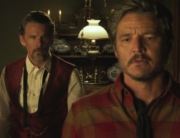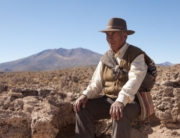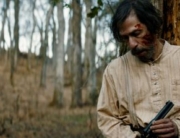Nicolas Cage remains quite the busy actor in 2023. Squeezed between his crazed, accusatory kidnapper in Sympathy for the Devil and his upcoming astral professor turn in Dream Scenario is Butcher’s Crossing, an adaptation of writer John Williams’s 1960 western novel. As always, Cage brings his trademark intensity to the role, albeit quiet and grizzled, as the point man for buffalo hunters embarking on what ultimately proves a foolhardy query. A sentiment that might apply to the adaptation itself: effortlessly intense and beautiful, even if the ending doesn’t quite hold up.
Just like the novel, Butcher’s Crossing follows young Will Andrews (The White Lotus’s Fred Hechinger), who has left his Harvard education behind to “Go West, young man,” as the old saying goes. His journey leads him to a small Rocky Mountain town that specializes in selling buffalo pelts, run by one of his minister father’s old congregants, McDonald (Paul Raci). But Will isn’t so much interested in a job as he is in exploring nature firsthand, to get up close with its beauty, and perhaps its harshness. This leads to him partnering with the veteran hunter Miller (Cage) on a buffalo hunt like no other.
As Will learns, Miller stumbled upon a valley in Colorado where buffalo roam freely, untouched by any known hunters in the area. That means a massive haul and enough pelts to make a man rich for life. So, Miller agrees to take Will, along with Miller’s one-armed compatriot Charlie Hoge (Xander Berkeley) and skinner Fred Schneider (Jeremy Bobb), to aid his journey. A journey that, upon the discovery of the buffalo herds, quickly bears fruit but soon falls prey to various hurdles of the natural variety, as well as the perils of human greed.
At just under an hour and 50 minutes, Butcher’s Crossing has little fat on it. There are few subplots, fewer excess characters—save for a chance encounter with a family traveling in a wagon—and little more to the story beyond the core four finding, shooting, and skinning buffalo until Miller’s vanity complicates the hunt for everyone. Sometimes this leaves the movie a little bit disjointed, particularly in how it drops Will’s relationship with prostitute Francine (Rachel Keller) and never revisits it aside from a few dream sequences. However, the movie is far more interested in other matters. Namely, presenting gorgeous natural backdrops and lamenting how man’s intrusion upon these landscapes diminishes the harmony between nature and civilization. Manifest destiny at work.
On those merits, Butcher’s Crossing works. Director Gabe Polsky—who predominantly works in documentaries like Red Army but who also directed 2013’s The Motel Life—and cinematographer David Gallego do a fantastic job making this world look spellbinding. Wide shots of plains, forests, and eventually snow make this slice of nature feel comforting, magical even, at least until the shooting starts. Watching Miller at work as he picks off animals one by one is unnerving in its casualness, a routine efficiency that slowly transforms the valley into a graveyard. While it takes until the film’s winter chapters for this desecration to affect Will, Fred, and Charlie, it is alarming at face value. Especially once the viewer becomes attuned to Miller’s fanatical preoccupation with bleeding the valley dry (metaphorically and literally) of buffalo for no good, or even monetarist, reason beyond the bragging rights.
As the film’s biggest star, Cage’s performance tends to loom over Hechinger and the other actors. But the main cast all deliver strong performances, and Butcher’s Crossing’s ability to generate drama and tension without succumbing to a massive shootout is impressive. Which makes sense. The movie is, after all, more in line with the McCabe and Mrs. Miller–style revisionist Western genre, offering a grittier, less romanticized depiction of frontier life and the lasting harm of America’s westward expansion. Thus, Cage plays Miller’s obsession straight, even when you expect the actor to go full Cage (or at least half Cage toward the end when things fall apart).
Nevertheless, the final act comes across as somewhat underwhelming. However much it brings the film’s central theme full circle, the results come off as rushed and frantic, with no time to explore what Will took away from his tribulations. This is a damn shame because the movie’s final text does a better job of underlining how much man’s ambition and killing nearly drove the United States’ bison population to near extinction. Butcher’s Crossing certainly leaves you feeling uneasy about this outcome. But perhaps it could have brought the story home if, ironically enough, the movie featured just a bit more Nicolas Cage craziness.







Leave A Comment